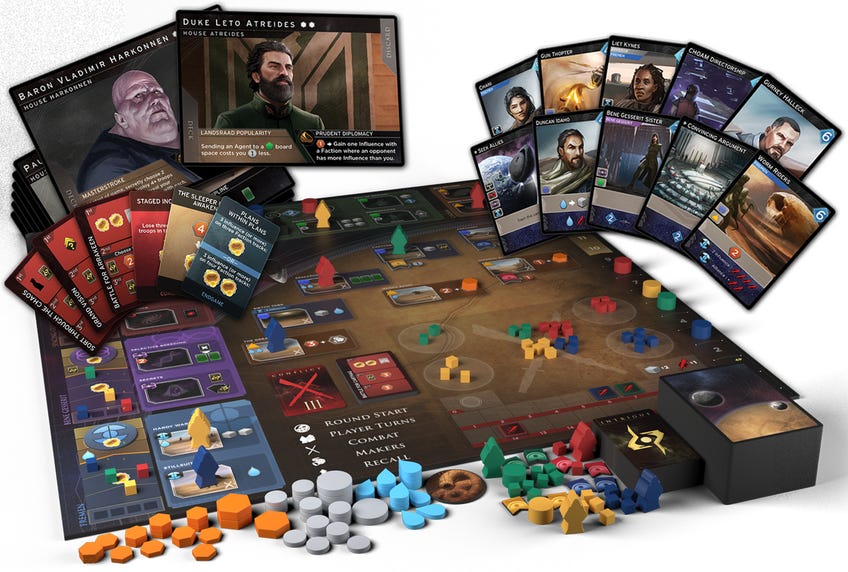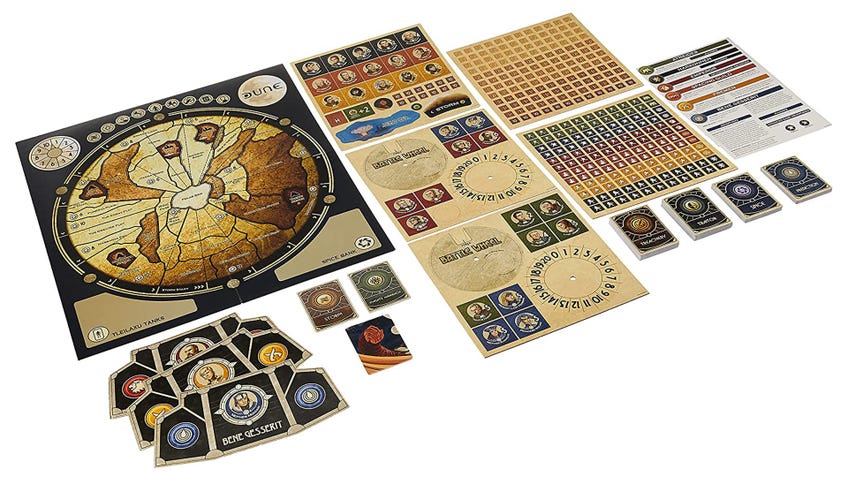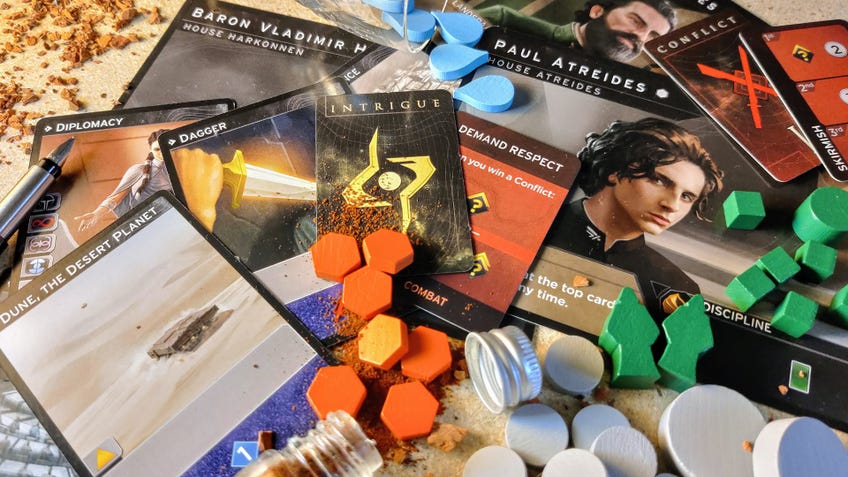Why are there so many good Dune board games?
Let the adaptations flow.
Dune: Imperium is a good board game. A combination of deckbuilding and worker-placement gameplay mechanics fuse together to create a game that rewards multiple playthroughs and experimentation, as well as lashings of that special ingredient that makes me enjoy almost any board game: competitive player interaction.
Dune: Imperium might be a good board game, but it’s not necessarily the best tabletop adaptation of the Dune franchise. There are several excellent board games based on Frank Herbert’s seminal science-fiction series. In fact, Dune might be the most successfully adapted series in board gaming history.
Alongside the brilliant Dune: Imperium - and its recent excellent expansion/re-imagining Dune: Imperium - Uprising - there are a plethora of other tabletop titles that have successfully adapted the Dune books and/or Denis Villeneuve’s Dune: Part One and Dune: Part Two films. From Dune: A Game of Conquest and Diplomacy, a board game that has players battling as warring Houses for control of the planet Arrakis, to two-player board game Dune: War for Arrakis - which pits House Atreides and the Fremen against House Harkonnen and the Emperor - to tabletop roleplaying game Dune: Adventures in the Imperium, when it comes to adaptations of Dune, players have a wide variety of enjoyable games to play.
But possibly the greatest - at least in terms of its influence - Dune board game ever released is the original Dune board game from 1979. Designed by the creators of the original Cosmic Encounter, Dune is a tabletop adaptation that actually successfully captures the core concept and feel of Herbert’s novel.
Each player takes control of one of several factions featured in the first book, with the goal of defeating the opposing factions and claiming Arrakis for themselves. During the game, players can utilise the unique powers of their faction against their enemies, all whilst gathering as much of the precious spice Melange as they can - whether through taking control of areas of the planet or acquiring power through political means.
The original Dune tabletop adaptation is so solid that it has since served as the basis for multiple other titles.
Players are free to choose their approach and face the ensuing consequences - whether good or bad - which feels like a natural translation of the high-stakes political games played by the characters of Dune. Alliances can be very quickly forged and discarded, with players allying themselves with whoever they need to continue their attempts to conquer Arrakis, much in the same way as Paul joins the Fremen or Lady Jessica balances her relationship between the Bene Gesserit and the Fremen Matriarchs. The cutthroat gameplay mechanics of Dune offer an accurate, yet harmless, playable version of the extremely compelling tense and dramatic world of the book.

It’s the kind of board game adaptation you wouldn’t have expected to have been released until the 2000s, at the earliest, when the board game industry really began publishing thematically rich titles that treated their source material with respect. The original Dune tabletop adaptation is so solid that it has since served as the basis for multiple other titles, including a 2019 remake and simplified spin-off, and become widely considered one of the best board games ever made, let alone the best Dune board game.
This is not always the case when it comes to licensed tabletop adaptations. Though recent years have seen a marked improvement in the quality of movie board games, there are hundreds of derivative titles based on the likes of Star Trek, Disney animated films, Star Wars and Transformers. For every Star Wars: Rebellion and Disney Villainous, there’s sure to be a Pop It! Star Wars Battle Game and Beauty and the Beast Gigantic Magic Mirror Game. It’s rare that franchises - especially lucrative ones like Dune - have such a clean track record for tabletop adaptations.
Dune's potential to support scenarios around viciously competing for power and control is something that the 1979 board game absolutely understood.
So why is Dune different? Perhaps it’s because almost zero tabletop adaptations of the series were released from the late 1980s until 2019, thereby avoiding the period of time where the market was flooded with cheap, cash-grabbing board games based on whatever licensed properties publishers could get ahold of. With the revival of interest in Dune stemming from the recent and very successful Villenueve films, rather than seeing a flood of bad or even mediocre board games from opportunist publishers, we’re actually getting so many great tabletop adaptations of the series.

Besides Dune offering a more politically-minded and mature approach to sci-fi than the likes of family-friendly franchises like Star Wars - making the audience for its tabletop adaptations generally skew closer to older players - the groundwork for a good Dune board game was already laid over 40 years ago. Whilst each Dune board game offers a different gameplay experience, it feels like the best options have a clear understanding of what makes the series fantastic source material for the tabletop - namely, its potential to support scenarios around viciously competing for power and control, something that the 1979 board game absolutely understood.
Though we might not see another Dune film in a while, with Villenueve set to take a break before beginning work on the film adaptation of Dune: Messiah, I’m hoping that the excellent Dune tabletop adaptations keep coming - or at least other franchises step up to the mark and commit to a more consistent level of quality in their board games.


